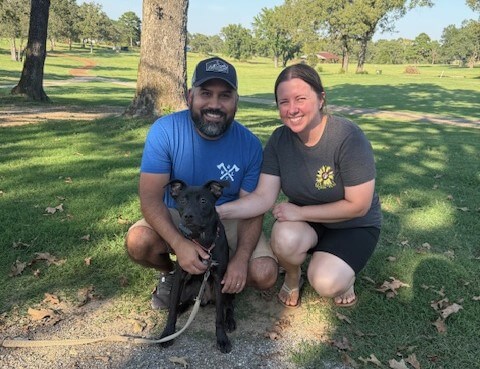When Can My Dog Stop Wearing the E-Collar?

One of the most common questions among dog owners using electronic collars is how long their dog should wear the device during Dallas dog obedience training.
There’s a lot of misunderstanding around e-collars: some view them as a last resort, while others worry dogs will become reliant on the collar and not obey without it. In reality, the e-collar serves as a precise communication tool that provides steady corrections to reinforce clear expectations.
Understanding the appropriate use and timing of the e-collar is essential to building lasting obedience and knowing when it’s time to rely on your dog’s training rather than the device.

When Should Your Dog Be Wearing the E-Collar?
The e-collar should be on any time there’s an opportunity to reinforce behavior.
Working and Sport Dogs
For working and sport dogs, the collar should be put on as soon as they leave the kennel and prepare to head to the training field. The collar should remain on during the entire training process, including the walk to and from the training location.
In many cases, training should also happen inside the kennel or around the home to ensure reliable follow-through regardless of the setting.
Pet Dogs
For pet dogs, the approach is even more straightforward. The collar should be on whenever the dog is with you and there’s a chance you’ll need to interrupt undesired behavior or reinforce a command.
That includes structured walks, supervised indoor time, and daily interactions. It should not be left on when the dog is unsupervised, such as overnight or when crated during the day.
How Long Can the Collar Be Worn and When Can It Be Removed for Good?
Safe Daily Wear Time
Dogs can safely wear an e-collar for 8 to 10 hours a day, provided the receiver box is repositioned several times to avoid the risk of pressure sores. The collar must always be used responsibly and only when you are available to observe and follow through with your dog.
Reducing Dependence on Corrections
As your dog becomes more reliable, you’ll find yourself needing to use the collar’s correction features less frequently. This is a natural progression that comes from consistency and repetition.
When your dog understands what’s expected and sees that you consistently follow through, steady corrections are needed less.
Knowing When to Remove the Collar
Eventually, the collar becomes more of a backup than an active tool. At that point, the decision to remove it depends on your dog’s consistency, especially in high-distraction environments or off-leash scenarios.
If you’ve put in the time and built a reliable response across different settings, you may find the collar can stay on the shelf most days. But if there’s still uncertainty, more so in open or unpredictable environments, it may be wise to continue its use.
Real-Life Training Is Where It Counts
Short training sessions in the backyard are helpful, particularly in the beginning, but they’re not the core of your dog’s learning. Training is really about what happens throughout the day: on walks, around the home, and in everyday interactions.
That’s where the e-collar proves its value, helping you maintain consistency in situations that matter.
Examples of meaningful training moments include:
- Reinforcing basics like “sit” at doors or staircases
- Interrupting rushing, barking, or lunging at the front door with a “here” or “sit” command
- Enforcing “kennel”, “sit”, or “down” during mealtimes or chores when you’d like the dog to remain in a designated spot, like an elevated pet bed
When training becomes part of everyday life, the collar turns into a support system for ensuring your dog follows through, even when distractions arise. Over time, that daily repetition leads to reliability, and eventually, less need for correction.

Get Expert Dallas Dog Obedience Training with One Shot Retrievers
For expert guidance tailored to your dog’s needs, contact One Shot Retrievers. Our team specializes in obedience and gun dog training, and we approach every dog with deep knowledge and a genuine commitment to their well-being.
Whether you're training for the field or the front porch, we’ll help you bring out the best in your dog—safely and effectively.

When Should Obedience Training Start? How Early Development Shapes Your Dog’s Behavior
Learn how early training shapes obedience. Contact One Shot Retrievers for trusted dog training in Tyler, Texas, and start today.
Read more
Should Every Dog Know How to Heel?
Learn why heel matters, how it reduces pulling, and how Jacksonville, TX, dog training experts teach clear, reliable walking behavior.
Read more




